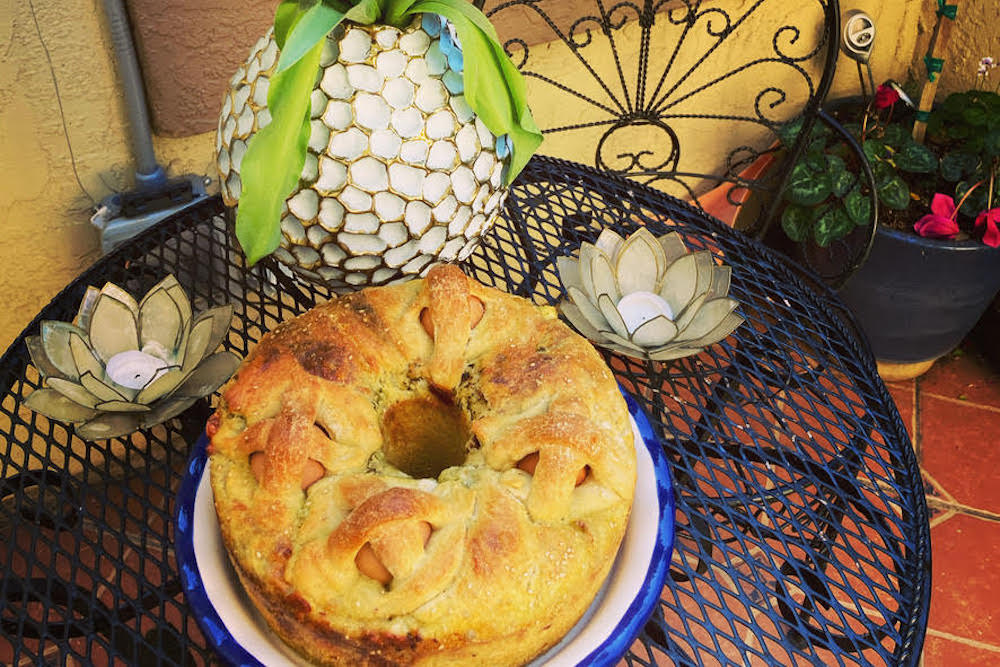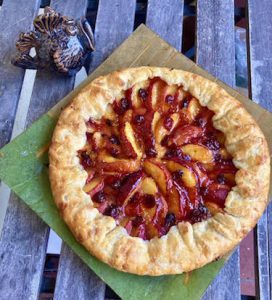
A Neapolitan Easter Bread stuffed with salami, provolone and eggs, and topped with four brown eggs in their shells, which baked in the oven.Baked and photographed by Marivi Soliven.
It’s July 2020, and San Diego is in a heat wave, but I don’t care; I’m baking bread. I can’t force fools on the street to wear masks, or stop the president from calling COVID-19 the “kung flu,” or protect Asian Americans from being assaulted for bringing in the “China virus,” but in my kitchen, I call the shots.
As I punch the risen dough, the phone rings. I turn my headset volume up, toss the dough on the counter, and answer.
In my nearly two decades as a telephonic Tagalog interpreter, I’ve learned to foresee a looming crisis just by tracking the frequency of certain calls. A flurry of bankruptcy cases preceded the great recession of 2008. That March, an uptick in COVID-related calls signaled that despite the naysayer in the White House, the pandemic was well underway.
Because I work from home, I can do chores while taking calls on my headset—although baking is really less a chore than a grounding ritual. It is easy, quiet, and above all, calming. I read somewhere that yeast was a kind of virus, just like COVID-19. This one leads to bread, that one, to death.
With the virus raging, I’ve been stress baking every week since March just to stay sane.
“Hello, this is Maria your Filipino interpreter. How can I help?”
The voice on the other end of the line introduces himself as Dr. Smith. I don’t know Dr. Smith, or any of the clients who call me for interpretation, but for the duration of this call, I will be the prime link between him and his patient.
“I need to give you a heads up,” he says, explaining that Consuelo, the patient he is calling about, is 87 and suffering from COVID pneumonia. “Her condition is worsening and we must discuss treatment options,” he tells me. “It may be difficult.”
“I understand,” I say.
“Difficult” doesn’t faze me. I’ve helped Filipinos get through thousands of difficult conversations: 9-1-1 calls, domestic violence reports, court trials, deportation hearings. I find the words they need to get through the ordeal.

A peach galette. Courtesy of Marivi Soliven.
There was the schizophrenic man calling the suicide hotline about angels hovering above a Home Depot on Thanksgiving night; the woman telling a detective she’d been dragged from the house by her hair; the son explaining in a bankruptcy hearing that he’d maxed out a credit card to pay for his father’s chemotherapy. “Difficult” is a daily part of my job.
Interpreters are like AC adapters for words, transforming English into other languages and back again. My biggest challenge is remaining neutral when conversations become fraught. With the onset of COVID-19, such conversations have multiplied.
A door whooshes open, and I hear a loud hum punctuated by beeps. It sounds like Consuelo is in a negative pressure room and is depending on machines to keep her alive. If this were Manila in the before times, I’d hear the laughter of relatives bringing adobo from home and gossiping over the telenovela playing on the hospital TV. But Consuelo is in the COVID section of the intensive care unit, where doctors and nurses don masks, gloves, and Tyvek suits, where visitors are forbidden. I wonder how long she’s been alone with the machines.
I’m grateful at least that the call began in the middle of my stress-baking routine. I shape the dough into a rectangle, and take comfort in the scent of yeast and butter. Dr. Smith cannot control his virus, but this yeast does as I please. When I expect it to lift the dough, it does.
“Hello, Consuelo, how are you feeling?” Dr. Smith says.
“Gandang araw po Consuelo kumusta po kayo?” I interpret his greeting, but add the honorific po because the doctor sounds too casual in how he’s addressing an elderly woman. Offering respect generally soothes an anxious patient.
“I’m OK.” Consuelo’s voice quivers. She doesn’t sound OK.
“Unfortunately, you’re not getting better.” I convey Dr. Smith’s tone of concern as I interpret, knowing this is where the bad news begins. “You’re on the maximum amount of oxygen, but you need even more. We have to intubate you.”
It’s a struggle to keep my voice steady. Early in the pandemic, a couple I knew in Manila caught COVID. Both were intubated. Only Kenny survived.
“No. You will not put a tube in my throat.” Consuelo sounds shaky but resolute.
“But your daughter has power of attorney, ma’am. She makes decisions now.” I interpret for Dr. Smith, softening his retort with a conciliatory po.
“Naku—not when I say no.” Consuelo pushes him away as easily as I push at my dough. “My daughter will not contradict me.”
As I interpret back and forth, I begin to sound as aggravated as Consuelo, which isn’t good. But since seamless interpretation requires me to speak in the first person, it’s hard not to mirror her pique.
Dr. Smith persists. “See how fast and shallow you are breathing? Your poor heart is working harder for oxygen. If it collapses from stress, we may not be able to save you.”
I’m not surprised to hear Dr. Smith plead. Consuelo sounds like the women in my family. Their stubbornness could stop a tank in its tracks.
“Doc, I’m old enough to be your grandmother. I know what’s best for me and what’s more, I believe in miracles.” I suppress a smile as I interpret, wondering if the good doctor is a man of faith.
Then she declares “Araw araw ako’y nagdadasal sa Panginoon, hindi niya ako pababayaan—”
“Every day I pray to God. He will not forsake me,” and my own voice cracks as I translate. How many times had my own grandmother said this, as cancer sucked her life away 25 years ago?
“I believe in miracles, too,” Dr. Smith says. “But unless we intubate, your lungs could fail, and your heart and other organs will follow.”
Consuelo falls silent. The hum and beep of machines fill the quiet. How do you respond when a doctor says you’re dying?
“Your daughter wants me to do everything possible to keep you alive. But as your doctor I’ll do what you want, even if I have to fight your family.”

Lemon braided bread. Courtesy of Marivi Soliven.
I fuss over my dough, trying to keep its edges straight and neat as this call becomes increasingly messy. Nevertheless, my hands shake as I sprinkle cheese. I know Dr. Smith can’t win. If Consuelo’s family is like mine, they will rage, weep, beg him to reconsider.
“I’d rather die than live with a tube in my throat.” Consuelo declares. “Pués—can I go home now to spend my last days with family?”
As I interpret Consuelo’s plea, my own throat tightens. I already know the answer to this one.
“I’m sorry, we can’t discharge you. You’re so contagious, we don’t even allow visitors. The nurse will set up a Facetime call. It’s the best we can do.”
Consuelo coughs, a jagged, deep-in-the-chest noise that goes on forever, and suddenly I’m 27 again, it’s midnight, and I’m home with my grandmother in Manila. The night nurse wakes me, panicking because grandma, weakened by years of colon cancer, is choking on her own spit. My aunt comes in a taxi and piles us into the back seat, grandma squeezed between us. As we speed to the hospital Tita Mercy chants aloud, “Holy Mary Mother of God pray for us sinners, now and at the hour of our death…”
Grandma died at dawn, surrounded by her nine children. But Consuelo? I see her shrink into her pillow, breathless at the thought of her remaining days, one long hour folding into the other, slipping away to a solitary end.
“Ingat po kayo, take care.” I whisper goodbye. If only I could reach through the phone and hug her.
I never find out what happens to Consuelo.
The calls multiply in the coming months: I conduct contact tracing interviews with a family who lost a father to COVID; file unemployment for an infected nurse; read the Lord’s Prayer to an ICU patient. The more distressing the conversation, the more urgently Filipinos cling to my voice over the phone.
“Ganito ba talaga, ate?” Is this how it’s going to be, older sister? my fellow immigrants say, automatically addressing me as kin. This is how Filipinos cope when we are frightened or confused: we create familial bonds even when there are none. After some calls I find it impossible to continue, yet it is impossible to stop. So, each day, I summon the words they need to survive this plague, and cling to my dough.
I make the pineapple upside down cake that was a childhood staple in Manila; recreate the banana bread I baked weekly as a preschool teacher; move on to babkas, chocolate-drizzled carrot cakes, lemon tarts, cinnamon rolls. Since I don’t like sweets, I give most of what I make to elderly friends stuck alone at home. The half-hour walk to bring them my baked goods at day’s end becomes yet another calming routine.
Even then I’m so stressed, I crack a molar from grinding my teeth in my sleep.
When Biden wins the election, hope begins to flicker, faint as the pilot light in my oven. Then vaccinations begin mid-December, and I feel that hope grow into a steady flame.
I remember Consuelo when I translate for another feisty Filipina in the new year. Luz is getting the COVID vaccine today. When I say it may give her a fever, she is undaunted.
“Salamat sa Diyos,” Luz sings, gratitude to God. The miracle is happening for her. I know it will happen for the rest of us, so I remind myself to be patient and wait for my next loaf to rise.
Editor’s note: All the patients’ names have been changed to protect their privacy, in accordance with HIPAA regulations.




Send A Letter To the Editors